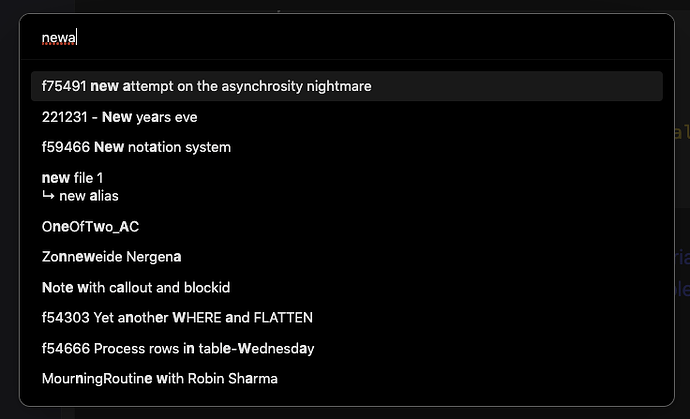Using parts of the code listed in previous post, I built the following template:
<%_*
// Get the destination file
const allFiles = await app.vault.getMarkdownFiles()
// .slice(0, 10) // Uncomment for test purposes of a smaller file set
const alternatives = []
function pushAlternative(path, basename, alias) {
alternatives.push({ path: path, basename: basename, alias: alias})
}
allFiles.map(file => {
const fileCache = app.metadataCache.getFileCache(file);
// Push non-aliased alternative
file.alias = file.basename
pushAlternative(file.path, file.basename, file.alias)
// Use the following to check for existence, and type of alias
const aliasType = typeof(fileCache.frontmatter?.aliases)
if (aliasType == "string") {
// Single alias
file.alias = fileCache.frontmatter.aliases
pushAlternative(file.path, file.basename, file.alias)
} else if (aliasType == "object" && file.frontmatter?.aliases.length ) {
// Multiple aliases
for (const alias of fileCache.frontmatter.aliases ) {
file.alias = alias
pushAlternative(file.path, file.basename, file.alias)
}
}
})
const destination = await tp.system.suggester(
item => item.basename +
(item.alias != item.basename ? `\n↳ ${ item.alias }` : ""),
alternatives,
true,
"Enter file",
10);
if (destination)
tR += `[[${ destination.path } | ${ destination.alias }]]`
_%>
As a sample image, I searched for “newa” in my test vault, and got this result:
As we can see in the image both the fuzzy matching, and the aliases works. (See files “221231 - New years eve” and “New file 1 → new alias”).
And choosing the latter of those it produces the link [[tmp/new file 1.md | new alias]]. Hope this helps!
( Now I just need to figure out how to create a new file link based upon this without having to trigger another tp.system.prompt() or similar, as I then can use this template to locate or create new forum response notes. ![]() )
)
